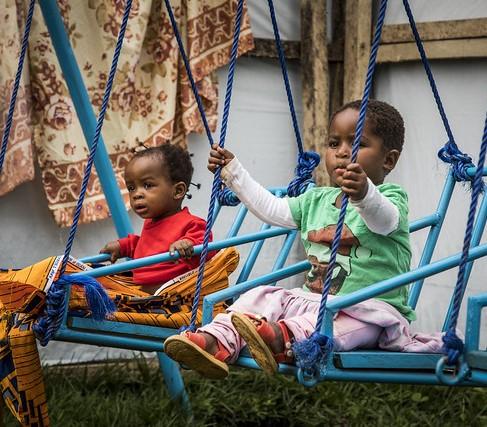The Ebola outbreak has killed more than 500 children in the Democratic Republic of the Congo (DRC) since the outbreak began last August, and deaths in kids have accelerated over the past 6 months, Save the Children, a nongovernmental group that is working in DRC, said yesterday.
In other developments, the DRC health ministry confirmed 7 new cases yesterday, and health officials in the DRC and neighboring Rwanda announced steps to curb unnecessary border travel.
Child deaths another 'grim milestone'
Last December UNICEF sounded the alarm about the high number of children infected in the outbreak, noting that one of every third people confirmed infected in the DRC's outbreak was a child, unusual for Ebola epidemics. The agency noted that 1 in 10 children were under age 5 and that kids were more likely to die from the disease than adults.
Save the Children said in its statement yesterday that around 737 children have been infected with Ebola in the DRC's outbreak. And based on the latest numbers, the impact on kids has increased. In the first 6 months of the outbreak, which was declared on Aug 1, 2018, just under 100 deaths in children had been reported. However, in the 6 months that followed, over four times as many have died.
Heather Kerr, Save the Children's country director in the DRC, said, "This is another grim milestone in a crisis that is devastating children in its path, especially the youngest. Some 40% of children who have contracted the disease are under the age of five, and many of them have died."
She also said the outbreak has had a wider impact on children because of the high overall fatality rate from the virus, with thousands losing at least one of their parents or separated from their families.
Aside from the trauma of losing a loved one, Ebola puts children at risk for stigmatization, isolation, or abandonment, Kerr said. "Children who are on their own face the very real danger of all kinds of abuse and exploitation, or of being recruited by armed groups. Children aren’t going to school because their parents have died and those taking care of them can't afford the school fees, or schools are closing due to insecurity."
Save the Children has been working in the outbreak zone since the epidemic began, with a focus on infection prevention and control as well as water sanitation and hygiene at health facilities. It is also helping with surveillance and communicating prevention messages.
Cases grow by 7 amid other developments
According to the World Health Organization (WHO) online Ebola dashboard, the DRC confirmed 7 more Ebola cases yesterday, raising the overall outbreak total to 2,781. Health officials are still investigating 382 suspected cases. Seventeen more people died from their infections, lifting the fatality total to 1,866.
In other developments:
- The government of Rwanda and the DRC, following a meeting in Rwanda, are discouraging people from unnecessary travel across the border, the Associated Press (AP) reported today. A statement issued following the meeting said people traveling for nonessential reasons will need clearance from both governments. The WHO has urged countries not to impose travel restrictions in the temporary recommendations it recently made in its public health emergency declaration. Travel restrictions could hurt the DRC's outbreak response, and global health experts worry that closing borders could force people to use informal entry points that don't have health monitoring.
- In an interview with the journal Science, Jean-Jacques Muyembe-Tamfum, PhD, a distinguished Ebola researcher from the DRC who was recently appointed by the country's president to lead the Ebola response, said the outbreak can be brought under control in 3 to 4 months, an ambitious but achievable target. In the report, Muyembe said he hopes to win back the outbreak region's trust by relying more on local people to work on the response and less on those from Kinshasa and from other countries.
- MONUSCO, the United Nations peacekeeping mission in the DRC, said yesterday that it will help the Congolese National Police (PNC) investigate a recent attack on an Ebola response team on a road between Beni and Butembo. An initial investigation found bullet holes in three vehicles carrying DRC and WHO doctors, which were being escorted by the PNC. No deaths were reported in the attack.
See also:
Aug 6 Save the Children press release
Dec 12, 2018, CIDRAP News story "Ebola outbreak grows as DRC issues alerts in Goma"
WHO online Ebola dashboard
Aug 7 AP story
Aug 6 Science story
Aug 7 MONUSCO report


















